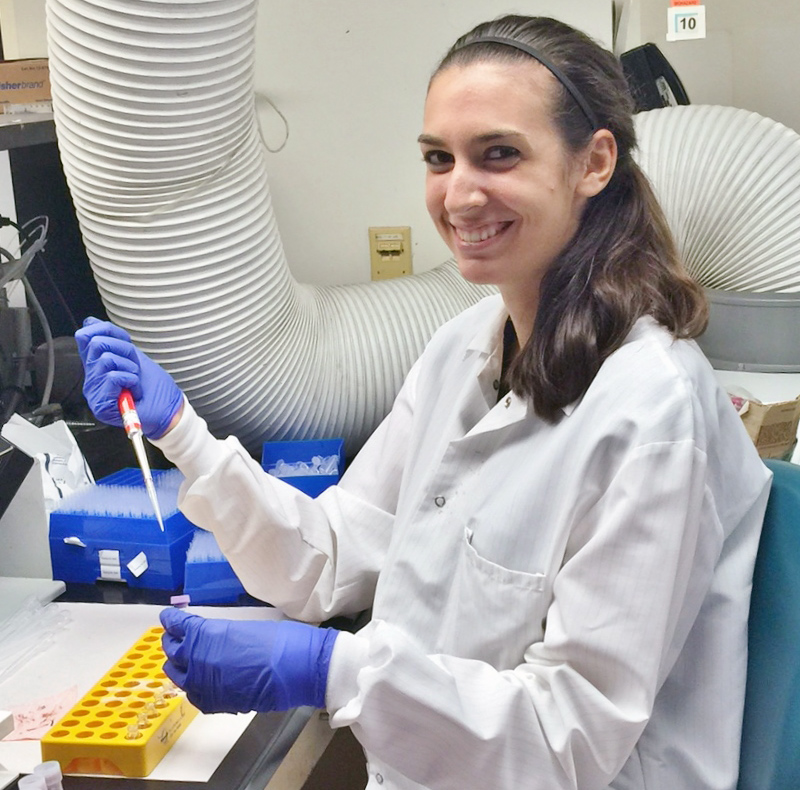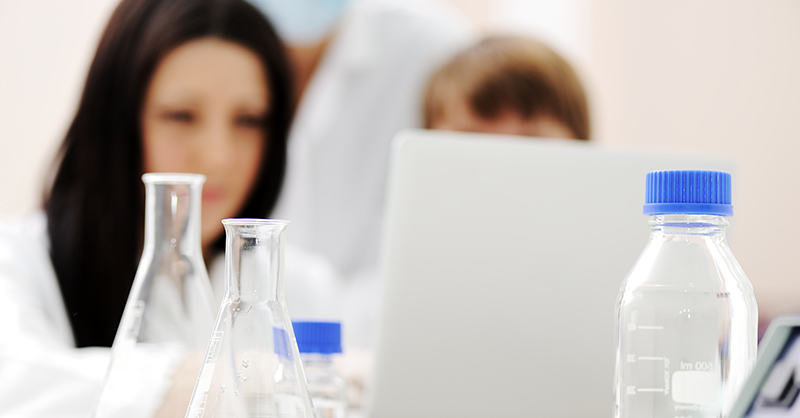Behind the scenes of every medical test you take, you’ll find a health care professional who analyzes and evaluates your samples. Medical laboratory scientists — also called clinical laboratory scientists or clinical laboratory technicians — are highly skilled health care professionals who look for the presence or absence of disease and provide data that helps physicians determine the best treatment for their patients.
Although they are not often directly involved with patients, medical laboratory scientists facilitate personalized care. They generate vitally important data for identifying and treating cancer, heart disease, diabetes and many other health conditions. We recently caught up with Stephanie Noblit, MLS (ASCP)CM, to hear more about the educational path that led her to this health care career.
ExploreHealthCareers.org (EHC): Thanks for your time today, Stephanie! Let’s start general — What inspired you to enter the health care field?
Stephanie Noblit, MLS(ASCP)CM (SN): I wanted to work in the health care field because it combined two things that I am passionate about, helping others and science. Science was always my favorite subject in school, but I like the area of biology the best. Helping others in my community was also something that I always valued. By working in health care, I am now able to use my knowledge of science to improve the health and well-being of the people in my community.
EHC: Can you tell our readers more about the education that’s required to get where you are professionally?
SN: I have a BS in Medical Laboratory Science from the University of the Sciences in Philadelphia, PA. After I graduated I also took a certification exam to become a certified medical laboratory scientist. A degree in medical laboratory science is great for anyone that likes experiential and hands-on learning. Degree programs for medical laboratory scientists (MLS) are often unique compared to other degree programs in that they have internships or clinical rotations built into the program.
There are two different program models that universities use: “3+1” and “2+2”. My degree program was a “3+1.” In a “3+1” program, the student takes 3 years of classes on campus and then in their fourth year they complete a yearlong internship at an affiliated hospital laboratory. In a “2+2” program students take two years of classes on campus and then have various clinical rotations in addition to classes during their last two years. In addition to those to models there is also the “4+1.” The “4+1” is great for people doing a dual degree program or for people that realize they want to enter the medical laboratory profession after they have graduated. This option allows them to complete an internship at a hospital laboratory and gives them the knowledge and qualifications to sit for their board exam.
One of the great things about the medical laboratory profession is that there are many different ways for people to become a part of the profession. MLS have a bachelor’s degree, but there are also medical technicians (MT) who have associate’s degrees. MLSs and MTs work in similar environments; the difference between them is the complexity of testing they are able to perform. Many MT to MLS bridge programs also exist for MTs that wish to earn their bachelor’s degree. In addition to the associates and bachelors level, medical laboratory professionals can pursue graduate degrees in clinical laboratory science. Our profession also recently expanded to include a doctorate program in clinical laboratory science (DCLS).
EHC: How did you choose your field specifically?
SN: When I was in high school, I didn’t know about the medical laboratory profession. This unfortunately is something that is not uncommon. Many people do not realize that our profession exists because they never see the laboratory when they go to the hospital. They see the doctors and nurses, but people rarely think about what happens to their blood after is it drawn. I had known that I wanted to work in health care, but I didn’t want to be a doctor or nurse because I didn’t want to have any patient interaction. I began looking at colleges and their biology programs.
When I went to visit the University of the Sciences, which is now my alma mater, I just happened to sit in on the medical laboratory science program informational session. As soon the program director, who would become my advisor once I enrolled, started explaining what the program and the profession was, I just fell in love with it. She said medical laboratory science is the “science behind medicine” and I knew that was exactly what I was looking for. I am lucky that I found out about this profession before I started college, but many people in the laboratory profession don’t find out about the profession until later. For many people, being part of the medical laboratory profession is a second degree and/or second career.
EHC: That’s amazing that you found your perfect career path fit! Speaking of your career, what is your current title and what do you do?
SN: My current title is medical laboratory scientist. Right now I am working at the Hospital of the University of Pennsylvania in their medical toxicology lab. In the medical toxicology lab, we test patient samples for drug abuse. We are really on the forefront of the opiate epidemic.

We also do therapeutic drug monitoring as well. Medical toxicology is only one area of the clinical laboratory though. There are many different areas and each one has an important role to play. Other things that medical laboratory professionals do are testing the blood sugar of a diabetic patient, determining if a patient has Leukemia by looking at the cells in their blood, finding antibiotics that will help treat a patient’s infection and matching a patient with blood for a safe transfusion.
My job in the medical toxicology lab was my first job after graduation. During my fourth year internship, I had spent some time in the toxicology lab. As I was nearing graduation, a job in that area opened up. Having liked my rotation in that area, I decided to apply. The internship is a good way to learn about what areas of the lab you may be interested in working in.
EHC: Do you have any advice for students interested in going into your field?
SN: My advice is take the time to learn about all the benefits of entering this profession. The medical laboratory profession is in high demand and it is very easy for qualified new graduates to find a job in the field. This profession also offers a lot of flexibility as there are many different areas to work in and a lot of different paths you can go down.
EHC: What do you wish you knew before you entered your field?
SN: I wish it would have been stressed more to keep an open mind. There are so many different possibilities when it comes to this field. Be open to everything and say yes to every opportunity that comes up. You may think you want to work in one area of the lab, but then realize you like another area better. Or you may think you want to become a lab manager later on, and then realize you want to work in public health instead. Don’t let yourself be blinded by only one option. Explore all the possibilities.
EHC: How do you stay up to date on happenings in your field?
SN: I stay up to date by being a part of my professional organization, the American Society for Clinical Laboratory Science (ASCLS). As a member of ASCLS, I have opportunities for continuing education and receive updates on what is happening in the field through journals and newsletters. Being active in your professional organization is a great way to network and connect with other professionals in your field.


Comment:
Nice post! Thanks for sharing.
Very beautiful and educative peace
am interested so much with this post, thanks so much for sharing.
am also a university student from Tanzania and am taking a Bachelor of Science in Health Laboratory Science, I wish also to reach at highest point of this field..
Great post for young college kids wanting to learn about the CLS/MLS degree!